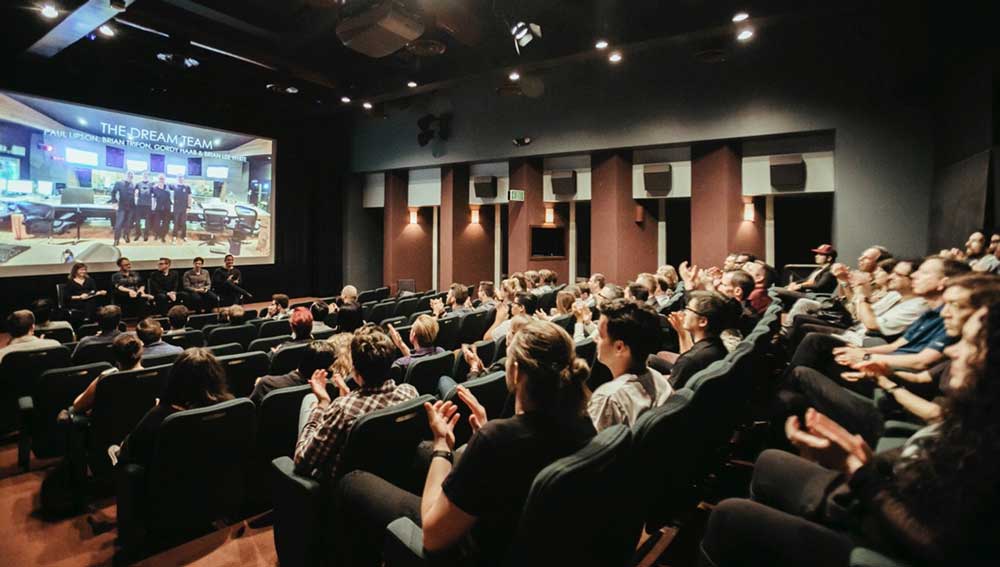
Paul Lipson, left, and Gordy Haab at the mixing board on the Newman Scoring Stage, with (second row, from left) Brian Trifon and Brian Lee White. (Photo: ScoringSessions.com)
The Xbox game Halo Wars 2 is shaking things up musically as the first game soundtrack in 12 years to recorded with American Federation of Musician union players on Twentieth Century Fox’s Newman Scoring Stage, where composer Gordy Haab conducted an 80 piece orchestra last fall for the February release.
For the final mix, Haab also integrated a 20-piece choir, recorded at Skywalker Sound, and meshed electronic music created by Finishing Move’s Brian Trifon and Brian Lee White. “We had an opportunity to do something new, and then you stay up at night thinking ‘How?’ But between Gordy and the Brians we really did create a singularity,” said Paul Lipson, who spent many years as head of music at Microsoft Studios and 343 Industries, the unit responsible for the Halo franchise, before being named VP creative at Formosa Group, where the soundtrack was produced.
Released digitally, on CD and as a “blood red” marbled vinyl collectors edition double LP, all from Sumthing Else Music Works.
“I approached the score very thematically, so each character had a theme, which was sort of an old-fashioned, traditional approach to the score,” Haab said, speaking at a Grammy contenders panel discussion at the American Film Institute’s Mark Goodson Theater Wednesday. Although the original Halo Wars was released in 2009, with a score by Stephen Rippy, Haab said for this iteration “we started completely fresh. The only callback to any theme was to the ‘Spirit of Fire,'” referencing the space ship, the ship in the game). “Otherwise all the music is totally new.”
“The music to Halo is such a pillar in the industry,” said Lipson, noting that in an October survey by the game streaming service Twitch, Halo was voted the greatest videogame music of all time, with more than 155,000 votes. “Adding something new was very important,” Lipson said, explaining it was his idea to blend a traditional orchestra with cutting edge electronic sound. Specifically, he had been looking for a project to work on with Haab, whose scores for the Star Wars games Battlefront and The Old Republic he’d long admired.
Haab said it has always been a dream to record on the Newman stage. “I moved here 17 years ago from Mechanicsville, Virginia, because I had always heard that if you want to get into film music, you have to be in Hollywood, that’s where all the greatest players are, and sure enough, that is a fact.”
The mandate of integrating digital and orchestral music presented interesting challenges, Haab explained. “They’d play a really cool piece with a synth effect, passing through a filter, and I wondered, how can I get that same effect with the orchestra? So I’d play muting combinations in the brass section, and pathing that around so the mutes were effectively the filter, and then combining that with some melodic material [Trifon and White] would come up with, and it would conter-align with something I’d come up with, and it really all fit together well,” he said, by way of explaining a cue called “Barren.”
The score required a complete range of musical emotions, ranging from battle-driven “face-melters,” as White called them, to delicate melodies and transcendent hero’s journeys, as was needed for a new AI character, Isabel. “It feels like Halo, but we’ve taken it forward into the next generation of Halo sound,” Lipson said. “Halo is a billion dollar franchise,” added Trifon. “We felt the weight of that, and respected the history while also striving to ensure that fans get something new and fresh.”

Composers chat with music professionals about the score to the game Halo Wars 2 at the American Film Institute’s Mark Goodson Theater (Photo: Maria Govea)


Comments are closed.